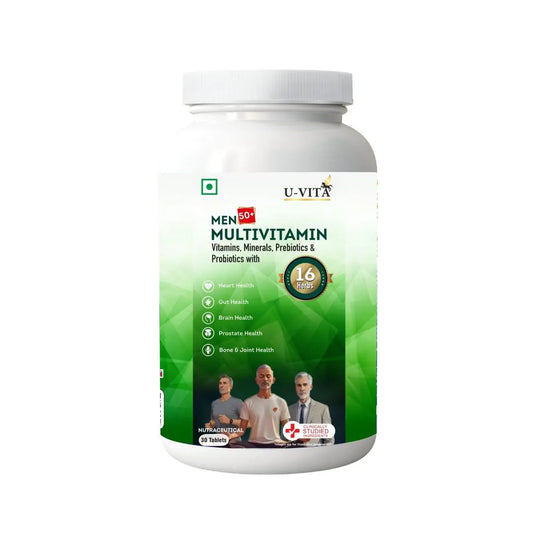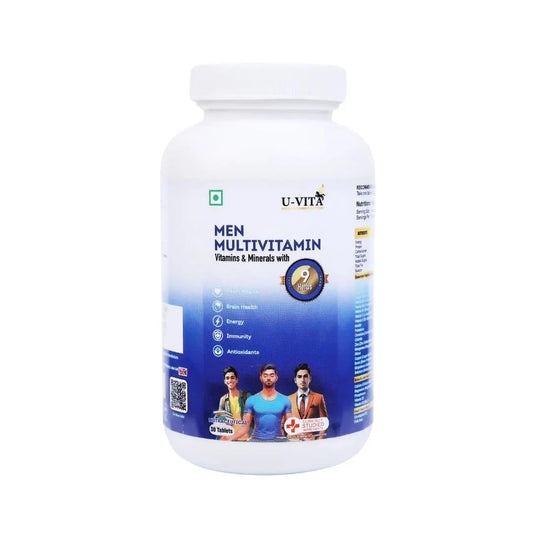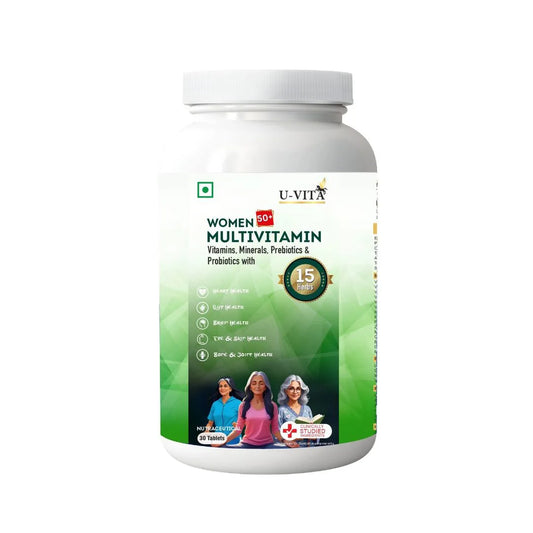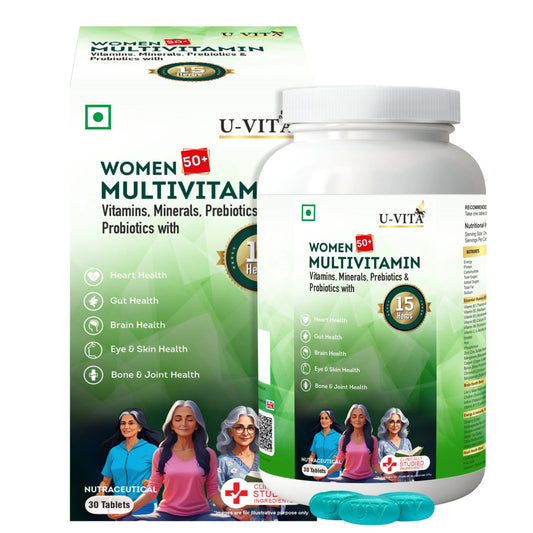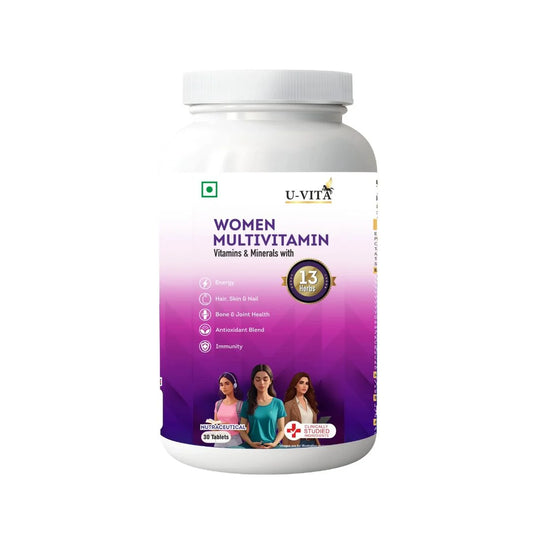Maintaining strong and healthy bones becomes increasingly important as we age. Bone health plays a key role in overall well-being, as strong bones help support our body, facilitate movement, and prevent injuries. From childhood through old age, the health of our bones can be influenced by many factors, including nutrition, lifestyle, and physical activity.
While a balanced diet and exercise are essential, bone health supplements can be crucial in supporting bone strength, especially as we age. Here, we have shared essential nutrients for bone health and how supplements can help maintain bone health.
Let’s understand.
What are the Essential Nutrients for Bone Strength?
 To maintain healthy bones, certain nutrients play a key role in supporting bone structure, strength, and density. Here are the most important nutrients for bone health.
To maintain healthy bones, certain nutrients play a key role in supporting bone structure, strength, and density. Here are the most important nutrients for bone health.
1. Calcium
Calcium is the primary building block of bones. It’s essential for maintaining bone density and strength. As we age, the body’s ability to absorb calcium efficiently declines, making it important to consume adequate amounts through food or supplements.
2. Vitamin D
Vitamin D helps the body absorb calcium and promotes bone health. It is also important in maintaining bone strength and reducing the risk of fractures. Sunlight is a natural source of Vitamin D, but supplements are often needed, especially in regions with limited sunlight or for individuals who spend most of their time indoors.
3. Magnesium
Magnesium regulates calcium levels in the body and helps with bone formation. It is essential for bone metabolism and helps maintain bone density. Magnesium also works with other nutrients to support overall bone health.
4. Vitamin K
Vitamin K is critical for bone mineralisation, the process by which calcium binds to bones. This vitamin supports bone density and helps in preventing bone loss, particularly in postmenopausal women. Leafy greens, dairy products, and fermented foods are good sources of Vitamin K.
5. Collagen
Collagen provides structural support to bones, tendons, and joints. It is the protein that gives bones their flexibility and strength. As we age, collagen production decreases, leading to weakened bones and joints. Supplementing with collagen can help improve bone strength and reduce the risk of fractures.
6. Arginine
Arginine is an amino acid that supports the production of growth hormones and nitric oxide, both of which are vital for bone regeneration and repair. It improves blood flow to bone tissues, increases calcium absorption, and helps maintain healthy bone metabolism. This makes it an important nutrient for long-term bone strength.
Maintaining Bone Health in Adults

-
Bone Health in Young Adults
During the early stages of adulthood, bone density is at its peak. However, the foundation for lifelong bone health is laid during this time. Young adults need to ensure they’re consuming sufficient calcium and Vitamin D to strengthen their bones and prevent future bone loss. This period is also crucial for engaging in physical activities like weight-bearing exercises and strength training to build bone mass.
-
Bone Health in Middle-Aged Adults
As we move into our 30s and 40s, bone density starts to gradually decrease. For women, this can be exacerbated by hormonal changes, especially around menopause. It’s crucial to increase the intake of bone-strengthening nutrients, such as calcium, Vitamin D, and magnesium, to maintain bone density. Additionally, regular physical activity is essential to prevent bone loss and reduce the risk of fractures.
-
Bone Health in Older Adults
In older adults, particularly after menopause for women, the body’s ability to maintain bone density slows down, leading to a higher risk of osteoporosis and fractures. This stage of life often requires additional support in the form of bone health supplements to prevent further deterioration. Calcium and Vitamin D supplements become especially important to support bone strength and reduce the risk of fractures.
Tips for Stronger Bones Throughout Life
1. Dietary Choices
Ensure that your diet includes plenty of calcium-rich foods like dairy, leafy greens, and fortified cereals. Add Vitamin D-rich foods such as fatty fish and egg yolks, along with foods that support collagen production, like bone broth and vitamin C-rich fruits.
2. Physical Activity
Weight-bearing exercises and strength training are key for building and maintaining bone density. Activities such as walking, running, dancing, and lifting weights promote bone strength.
3. Avoiding Harmful Habits
Excessive smoking and alcohol consumption can weaken bones and increase the risk of fractures. Limiting alcohol intake and quitting smoking can help protect bone health in the long run.
4. Getting Enough Sunlight
Sunlight is a natural source of Vitamin D, which is essential for our bone health. Spend time outdoors to ensure your body produces adequate Vitamin D to absorb calcium effectively.
To Sum Up
Strong bones are built through the right nutrients and consistent care. Prioritise essentials like Calcium, Vitamin D, Vitamin K, and Magnesium to maintain bone strength and prevent future issues.
For complete bone support at any age, U-Vita’s bone health supplements offer a reliable way to keep your bones strong and healthy every day.
Take charge of your bone health today to give your body the strength it deserves!
FAQs
Do bone health supplements really work?
Yes, when combined with a balanced diet and exercise, bone health supplements can help maintain bone density and prevent fractures.
Is Vitamin D necessary for bone health?
Absolutely. Vitamin D helps your body absorb calcium, making it essential for maintaining bone density and strength.
Can bone health supplements prevent osteoporosis?
They can help reduce the risk by maintaining bone density and providing essential nutrients for bone regeneration.
Are bone health supplements safe for daily use?
Yes, most are safe when taken as directed, but it’s best to consult your doctor for the right dosage.
How long does it take to see results from bone health supplements?
With consistent use, most people notice improvements in bone strength and reduced joint discomfort within 2–3 months. However, the results may vary from person to person.



